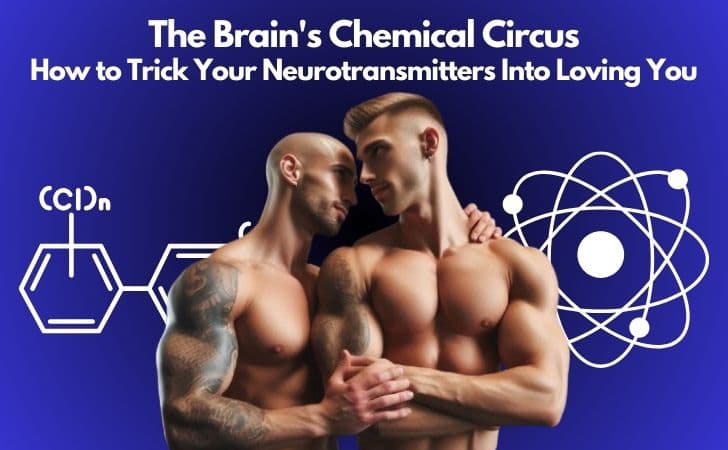People chase happiness like it’s some kind of rare, mystical treasure. The joke is, brains are basically tiny drug factories willing to hand out free samples all the time. Four major chemicals control mood, motivation, and the urge to hug random people at parties. Instead of waiting for a good day, tricks exist to force these chemicals into action on demand.
1. Endorphins: The Built-in Painkillers That Turn You Into a Maniac
Pain should feel bad, but endorphins love ruining that logic. These chemicals convince people they’re enjoying themselves while wrecking their bodies.
The right activities make endorphins flood the system like a fire sale at a pharmacy. That means forcing these little wonders out at every opportunity.
Low Endorphin Levels?
If your endorphin level is low, what should be minor discomfort can become unbearable. Chronic pain feels sharper, stress levels stay high, and motivation drops dramatically. People with low endorphins may struggle with mood swings, persistent fatigue, and an overall sense of dissatisfaction. A lack of this chemical leaves the body feeling raw and vulnerable.
A dramatic endorphin boost requires pushing the body to its limits. Intense exercise, extreme laughter, and exposure to controlled pain trigger a massive flood. Skydiving, ice baths, and even endurance sports overload the system with endorphins. The more the body believes it’s in distress, the harder it works to counteract the pain with pleasure.
- Exercise until the world looks brighter. Moving intensely for long enough forces endorphins to dull pain and create a weirdly euphoric state. That explains why some people run for hours with no logical reason. The brain bribes the body into continuing.
- Have sex to reset your brain chemistry. Physical intimacy floods the brain with endorphins. That’s why post-romantic bliss feels like floating. The body rewards connection with chemical relief.
- Laugh until your stomach hurts. A good laugh tricks the brain into releasing painkillers. That explains why people crack jokes in terrible situations. The body literally forces humor as a survival mechanism.
- Eat spicy food just to suffer. The body reacts to extreme spice like it’s actual pain, triggering endorphins to fight back. That’s why some people claim a ghost pepper made them feel “alive.” Pain plus chemistry equals bizarre pleasure.
- Burn essential oils like a wizard casting spells. Certain scents trick the brain into relaxation, flooding it with feel-good chemicals. That’s why people swear lavender can fix anything from stress to existential dread. Smell alone can hack brain chemistry.
- Dance like nobody’s watching. Rhythmic movement causes an endorphin surge. That explains why dancers look ridiculously happy. Moving freely confuses the brain into thinking everything is perfect.
- Get creative even if you're bad at it. Painting, playing music, or writing can spike endorphins. That’s why hobbies feel therapeutic. Making things tricks the brain into satisfaction.
- Eat dark chocolate like it’s medicine. Cocoa triggers an endorphin rush. That explains why stress-eating chocolate feels comforting. The brain treats it like a reward.
- Drink red wine in moderation. Small amounts trigger endorphin release. That’s why a glass of wine after a long day feels so relaxing. The brain links it to comfort.
Pros and Cons of Endorphins
- Pros: They relieve pain, reduce stress, and make physical activities feel enjoyable. They can create a euphoric state that makes difficult tasks easier. Regular release strengthens mental resilience.
- Cons: The rush is temporary, requiring constant stimulation. Overreliance on intense activities for an endorphin boost can lead to injury. Chasing the high sometimes encourages reckless behavior.
2. Serotonin: The Mood Stabilizer That Keeps You Sane
Serotonin controls mood, sleep, and overall emotional stability. Low levels lead to depression, anxiety, and irritability. People lacking serotonin often feel restless, struggle with insomnia, and have trouble enjoying things that once made them happy. Without enough serotonin, even the smallest stressors feel unbearable.
A dramatic serotonin boost requires exposure to sunlight, physical movement, and certain foods. Spending time outdoors, engaging in physical activities, and eating high-tryptophan foods push serotonin levels higher. Meditation and positive thinking can also stimulate serotonin production.
- Meditate and breathe deeply. Deep breathing exercises calm the nervous system. That’s why meditation reduces stress. The brain rewards stillness with serotonin.
- Do yoga even if you're inflexible. Yoga increases serotonin levels naturally. That’s why yoga practitioners seem so calm. Stretching and breathing reset the nervous system.
- Spend time in nature and feel the benefits. Walking through green spaces elevates serotonin. That’s why hikers always look refreshed. The brain enjoys the simplicity of natural surroundings.
- Soak up the sun whenever possible. Sunlight directly stimulates serotonin production. That’s why winter months feel mentally draining. Bright light helps lift mood.
- Relax in an infrared sauna. Heat exposure increases serotonin. That’s why sauna sessions leave people feeling blissed out. Warmth resets brain chemistry.
- Get a massage and let go of stress. Physical touch boosts serotonin levels. That’s why massages feel like emotional therapy. Human connection encourages serotonin production.
Pros and Cons of Serotonin
- Pros: It stabilizes mood, improves sleep, and reduces stress. Higher levels lead to overall well-being. It regulates digestion and helps prevent emotional swings.
- Cons: Low levels cause anxiety and depression. Too much serotonin can lead to lethargy and reduced motivation. Artificial serotonin boosters may have unwanted side effects.
3. Oxytocin: The Love Hormone That Makes You Trust Everyone
Oxytocin is responsible for bonding, trust, and emotional connection. Low levels cause loneliness, detachment, and difficulty forming relationships. Without oxytocin, people feel disconnected from others and struggle to maintain friendships or romantic relationships.
Dramatically increasing oxytocin requires meaningful social interaction. Hugs, laughter, and spending time with loved ones push oxytocin levels higher. Even petting a dog or singing with others can flood the brain with this bonding chemical.
- Pet an animal and feel instant connection. Cuddling pets boosts oxytocin levels. That’s why dogs and cats are such great companions. The brain rewards gentle touch with warmth and trust.
- Hug someone and hold on a little longer. Long hugs release oxytocin. That’s why embracing someone deeply can feel emotionally healing. Physical contact builds trust.
- Talk to a loved one on the phone. Hearing a familiar voice increases oxytocin. That’s why long conversations with friends feel so fulfilling. Social interaction matters.
Pros and Cons of Oxytocin
- Pros: It builds relationships, increases trust, and lowers stress. Higher oxytocin levels create a sense of belonging. It promotes emotional resilience and deep bonds.
- Cons: Excessive oxytocin can lead to over-trusting others. High levels may create emotional dependence. It requires ongoing social interaction to maintain its effects.
4. Dopamine: The Reward Chemical That Keeps You Going
Dopamine is responsible for motivation, focus, and pleasure. Low levels cause procrastination, lack of enthusiasm, and difficulty feeling excitement. Without dopamine, even enjoyable activities feel dull and unrewarding. People with dopamine deficiencies often struggle with productivity and maintaining long-term motivation.
A dramatic dopamine boost requires structured rewards, movement, and mental stimulation. Small accomplishments, music, and exercise push dopamine levels higher. Setting clear tasks and rewarding progress keeps dopamine flowing steadily.
- Listen to upbeat music and let it fuel your brain. Music naturally increases dopamine. That’s why people feel energized after hearing their favorite song. The brain reacts positively to rhythm and melody.
- Eat a protein-rich diet for mental clarity. Protein sources like eggs, chicken, and tofu contain amino acids that support dopamine production. That’s why high-protein meals improve focus. Fueling the brain properly keeps motivation high.
- Exercise regularly to keep dopamine levels high. Physical movement encourages dopamine release. That’s why workouts improve mood and focus. The body rewards action with motivation.
- Get a good night's sleep to reset your brain. Sleep deprivation reduces dopamine levels. That’s why poor sleep leads to lack of motivation. Rest restores balance and keeps energy levels steady.
- Complete small tasks and celebrate progress. Crossing things off a list triggers dopamine release. That’s why productivity feels satisfying. Every accomplishment gives the brain a rewarding hit.
- Meditate and reset your mental focus. Meditation increases dopamine and reduces stress. That’s why mindfulness practices boost motivation. A calm brain stays productive.
- Spend time in the sun and soak up natural energy. Sunlight encourages dopamine production. That’s why people feel more energized outdoors. Light exposure directly affects brain chemistry.
- Eat chocolate for an instant dopamine hit. Dark chocolate contains compounds that boost dopamine. That’s why chocolate feels comforting. A small piece lifts mood instantly.
Pros and Cons of Dopamine
- Pros: It drives motivation, focus, and enthusiasm. Higher dopamine levels make tasks feel rewarding. It helps fight procrastination and boredom.
- Cons: Low levels cause lack of drive and difficulty feeling excitement. Too much dopamine can lead to impulsivity and addiction. The brain craves constant stimulation, making balance difficult.
Conclusion
Brains don’t need permission to hand out free highs. The right tricks force neurotransmitters to play nice, turning ordinary days into something resembling fun.
Chemical manipulation isn’t limited to scientists; anyone who desires to enhance their enjoyment of life can benefit from it. The only question left is which neurotransmitter to mess with first.




